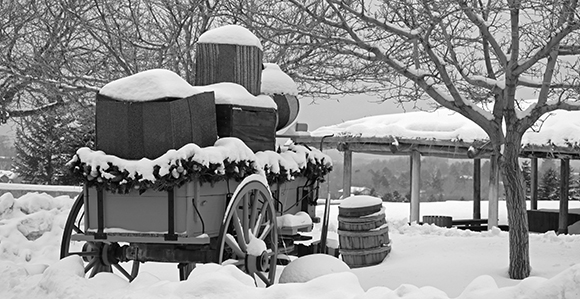Viewpoint: Christian Service
Contributed By the Church News

George Sidney Schow, the mailman from Cardston, had traveled through a snow storm to deliver 10 large crates to the family that had arrived in Cardston late in the day on Christmas Eve. The trip to the Jeppson’s house in the snow had taken the postman eight hours.
“May we experience the joy of setting aside convenience and personal comfort, if need be, in favor of Christian service.” —President Thomas S. Monson
On Christmas Eve in 1927 in the remote Hillspring, Alberta, Canada, Mary Jeppson put her five small children to bed.
Times for the family were hard. Ellen—the oldest of Mary’s children—was cynical about Christmas during a winter when the family’s only milk cow had died of starvation.
Earlier in the year, Mary had received a letter from her sisters in Idaho, who offered to send the family something for Christmas. In response, Mary had requested necessities—food, coal, socks, and gloves.
At the close of the letter she wrote, “If you could just find a dress that someone has outgrown, I could make it over to fit Ellen. She is far too somber for such a young girl. She worries so about the family and about our needs. She has only one dress that she wears all the time, and it is patched and faded.”

The week before Christmas Mary’s husband rode to Cardston every day to check the train station and post office for a package. But one did not arrive.
Then as Mary was preparing for bed on Christmas Eve, a knock came at the door. There stood George Sidney Schow, the mailman from Cardston. He told Mary he knew they were waiting for a package from Idaho and that there would be no Christmas without it.
He had traveled through a snow storm to deliver 10 large crates to the family that had arrived in Cardston late in the day on Christmas Eve. The trip to the Jeppson’s house in the snow had taken the postman eight hours.
The crates were filled with quilts, socks, shoes, coats, food, and money for coal.
A letter in the package from Mary’s family said, “We hope you have a Merry Christmas and thanks for making our Christmas the best one we’ve ever had.”
“Christmas is many things to many people—from the eager, materialistic grasping of a child for a present to the deep spiritual thankfulness of the mature heart for the gift of a Savior,” wrote Thomas S. Monson in the book he authored about the Jeppson’s Christmas. “If there is one common denominator, perhaps it is this: Christmas is love. Christmas is the time when the bonds of family love transcend distance and inconvenience. It is a time when love of neighbor rises above petty day-to-day irritations, and doors swing open to give and receive expressions of appreciation and affection.
“If to our Christmas gift list is added the gift of service—not only to friends and family, but also to those who badly need help—then our giving can be complete,” wrote President Monson (“A Christmas Dress for Ellen,” retold by President Thomas S. Monson, 1998).
As we ponder the gifts we give and receive each Christmas we should not forget the greatest gift ever given—the gift of Jesus Christ from the Father. The gift was so important that even the angels rejoiced. “For unto us a child is born, unto us a son is given ... and his name shall be called, Wonderful, Counselor, The Mighty God, The Everlasting Father, the Prince of Peace” (2 Nephi 19:6).
“As we celebrate the birth of Jesus Christ this Christmas season, our hope is that the light and testimony of the Savior’s divine mission as the Redeemer of all mankind will come into our hearts and be reflected in our thoughts, our words, and our actions,” wrote the First Presidency this year in their annual Christmas message. “May each of us be blessed at this joyous season of the year as we acknowledge with sincere gratitude the Father’s incomparable gift to us of His Son, Jesus Christ, our Lord and our Master.”
President Monson said on December 4, 2011, at the First Presidency Christmas Devotional, that there is “no better time than now, this very Christmas season, for all of us to rededicate ourselves to the principles taught by Jesus Christ” (“Because He Came”).
Even while witnessing the annual commercialization of Christmas—of seeing Christmas become less about Christ and more about sales, parties, and presents—we can all make the Christmas story part of our everyday lives, he said. “Christmas is what we make of it,” President Monson explained. “Despite all the distractions, we can see to it that Christ is at the center of our celebration. If we have not already done so, we can establish Christmas traditions for ourselves and for our families which will help us capture and keep the spirit of Christ.”
Mary and her family felt the spirit of Christ come into their hearts and home on that stormy Christmas Eve. Mary’s sisters had reached out with gifts and supplies and, in the process, felt the true spirit of Christmas. And the postman—a modern Santa Claus of sorts—had delivered the packages to a desperate family in the middle of a storm.

“That morning with the Christmas dress for Ellen, a childhood had been brought back, a childhood of hopes and dreams and Santa Claus and the miracle of Christmas.”
President Monson wrote that when Ellen, the oldest child, awoke that Christmas morning the family experienced “the most wonderful miracle.” She found a beautiful red Christmas dress. “She later said it was the most wonderful Christmas ever. That morning with the Christmas dress for Ellen, a childhood had been brought back, a childhood of hopes and dreams and Santa Claus and the miracle of Christmas.”
Quoting the lyrics of the Christmas carol, “O Little Town of Bethlehem,” President Monson said: “How silently, how silently The wondrous gift is giv’n! So God imparts to human hearts The Blessings of his heav’n. No ear may hear his coming; But in this world of sin, Where meek souls will receive him, still The dear Christ enters in.”
“May all of us welcome the Savior of the world into our hearts this year and into our Christmas celebrations,” President Monson wrote. “May we experience the joy of setting aside convenience and personal comfort, if need be, in favor of Christian service. Then may we learn, as did the ancient prophet, that when we are in the service of our fellow beings, we are truly in the service of our God” (see Mosiah 2:17).
